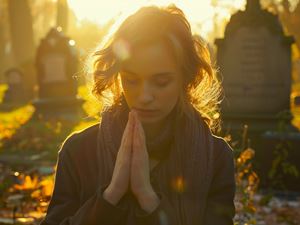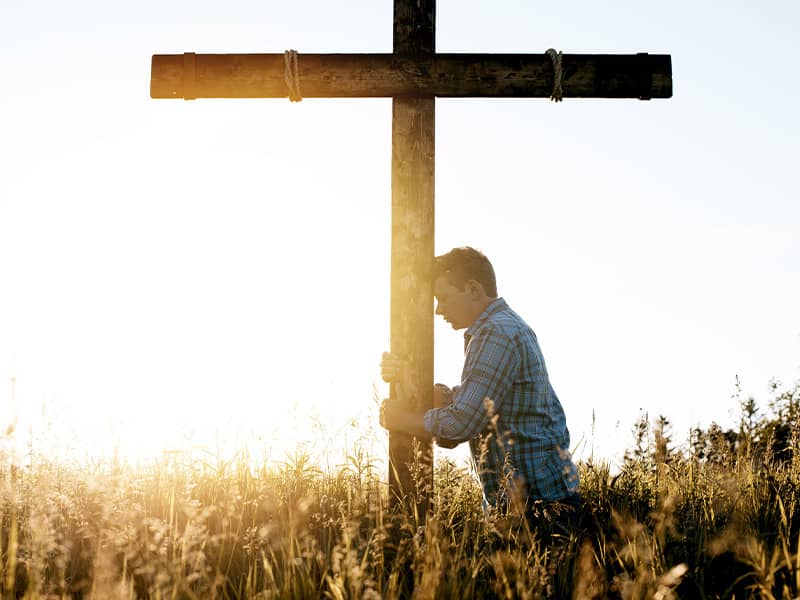
Prayer is a constant part of our lives. According to the Pew Research Trust, 55 percent of Americans pray daily. While you’ve already experienced the benefits of prayer, you may not realize how controversial it can be. The Bible encourages you to “pray without ceasing,” so you may wonder why it matters how or to whom you pray.
The Bible teaches us how to pray and offers guidance on how not to pray. One of the most controversial aspects of prayer is praying to the dead. So, what does the Bible say about praying to the dead?
So, if that prayerful communion involves speaking with the dead, why does the Bible prohibit and discourage it? After all, when a loved one has passed, it may be tempting to pray for them. It’s a difficult time, and you may feel comforted by that connection.
But what does the Bible say about praying to the dead? Why is it controversial, and what can we learn about how prayer affects our lives? Why did the early church pray to the dead and why is it so discouraged by more modern Christian practices? Let's look at what the Bible says.
What Does the Bible Say?
The Old Testament bans talking to the dead, which includes using psychics, mediums, charmers, or other magicians. It goes against God’s will. In Deuteronomy 18:10-11, you learn that communicating with the dead is considered an abomination that’s punishable by death by stoning. Similarly, Leviticus 19:31 warns about turning to necromancers, mediums, or spiritualists.
Even the first king of the Israelites, Saul, was tempted to speak with the dead after Samuel, the prophet, died. In 1 Samuel 28, Saul communicated with Samuel by disguising himself and consulting with the Witch of Endor.
Saul had banished her and other magicians from the kingdom. When she realized who he was, she called him a hypocrite. Still, she conjured Samuel, who told Saul he’d lose the battle, his sons, and his life. The simple account is a reminder of the consequences of talking with the dead.
For Protestants, prayer is a way to talk to God, but talking to the dead is prohibited as a possible form of idolatry. So, while praying to the dead may connect you to the spiritual realm, it could also be a form of ancestry worship.
In the Lord's Prayer, it’s clear that our prayers should be directed to “Our Father who art in heaven.” But Luke 16:19-31 also demonstrates how Jesus has authority over life and death as he resurrects Lazarus from the dead.
Paul, the apostle, discusses the power of prayer in 1 Timothy 2:5. We pray for the salvation of others, but we also come to God with requests for our needs. Romans 8:34 reminds us that Jesus intercedes on our behalf as He sits at the right hand of God.
The practice of talking with the dead is not new. It dates to ancient times, with ritualistic practices of communicating with the dead. Now, it's seen as part of occult practice, which often include interaction with the supernatural. The unknown forces involve astrology, divination, and even alchemy.
Early Christians prayed to the dead to unify their faith in communion with the saints. In the catacombs, they met secretly to commemorate fellow believers' deaths. They washed the corpses of the faithful, purifying them and preparing them for the afterlife.
In Medieval practice, believers also prayed to the saints, asking them for protection and patronage. Purgatory inspired the faithful to pray for the dead. It was a way to intercede on behalf of those who passed and speed them on their journey to heaven.
Lessons For Your Spiritual Journey
Dedicated prayer to the dead may vary depending on your denomination and religious background. While Catholics have a longer history of praying to the saints, some Protestants reject prayers to the dead. Here’s a quick overview of how denominational differences may affect best practices on prayer and praying for or to the dead.
Studies have found that bereavement hallucinations can be healing, but the Catechism of the Catholic Church rejects divination practices, including “conjuring the dead.” While some forms of praying to the dead are discouraged, some Catholics still believe that praying for the souls of the dead is okay, along with offering a Mass in their name.
The Reformation movement rejected the practice of talking to the dead or praying on behalf of the dead. Death puts an end to the living, and the souls of those who have passed are in Heaven or Hell. Concern for the dead is in God’s hands, and the Church typically sees communication with those who have died as an occult practice.
Biblical teachings on prayer to or for the dead are clear, but interpretation has changed over the centuries. You should always study and reflect on your faith and your personal journey with God. Prayer is a constant part of that.

